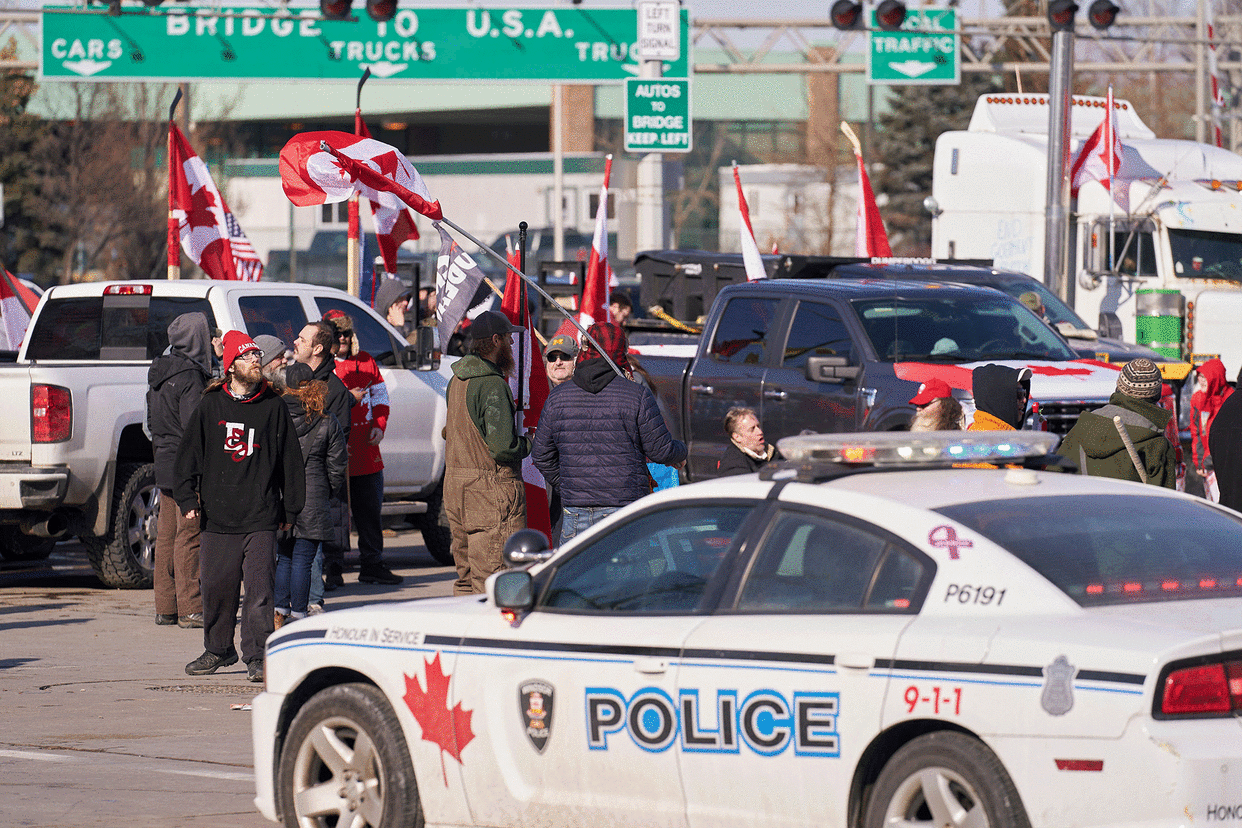'Freedom Convoy' Protesters Block Three U.S.-Canada Border Crossings

On Thursday, borders to the U.S. in Manitoba, Alberta, and Ontario were blocked off by swarms of protesters with semi-trailer trucks, farm machinery, and other vehicles.
The size of the blockade on the US side of the border. pic.twitter.com/LbKaHIjWxA
— Aaron Ginn (@aginnt) February 8, 2022
The blockade is part of the ongoing “Freedom Convoy” occurring in cities throughout the Canada, spurred by people opposing federal vaccine mandates for truckers and COVID-19 restrictions. The protests began in Ottawa and have since blocked off borders from Emerson, Manitoba to Pembina, North Dakota; Coutts, Alberta to Sweet Grass, Montana; and the Ambassador Bridge at Detroit to Windsor, Ontario.
As the situation escalates Ottawa police have warned protesters participating in the blockade they may be “arrested without a warrant.”
The protests have already led to at least 23 arrests and 80 criminal investigations in Canada’s capital.
A demonstration involving a large number of vehicles & farm equipment is blocking the Emerson Port of Entry. No traffic is getting through either northbound or southbound. The Port of Entry is shut down. Please avoid the area. #rcmpmb is on scene. pic.twitter.com/SpKzwzMfKZ
— RCMP Manitoba (@rcmpmb) February 10, 2022
Highway 75 in Manitoba is overflowed with semi-trailer trucks, farm machinery, and other vehicles blocking the province’s main border to the U.S. on Thursday.
No traffic is able to pass through with both northbound and southbound lanes taken over by protestors.
RCMP spokesperson Sgt. Paul Manaigre said plans are underway for Winnipeg Mounties and the Morris detachment to begin a dialogue with protestors. “That’s the critical piece is getting that beginning conversation going,” he told the CBC. Fears of the situation escalating prevent Manaigre from taking a heavy-handed approach. “You want to start off on the right foot and hopefully progress is made.”
Sign in Emerson, Manitoba, Canada reads “Border crossing closed until mandates are lifted”.
pic.twitter.com/FCYzaCd14Q— Marie Oakes (@TheMarieOakes) February 10, 2022
Manaigre warns that the blockade could prevent emergency vehicles from passing through. Obstructing medical services to those who need it can result in a criminal charge, fines, or vehicles being towed away.
Tickets have already been issued by the RCMP to protesters blocking the Coutts, Alberta border-crossing highway. Delays at the Coutts border are estimated to be up to seven hours long.
“They’ve got to go,” Roberta McKale, an Albertan RCMP superintendent, told reporters at the Coutts border on Wednesday. “You can’t arrest your way out of the choices that people are making… The best thing is for them to make the decision to leave.”
The superintendent says asking the protesters to leave has not been working and she believes using enforcement options will be needed.
The US-Canada border in Alberta today. pic.twitter.com/a0c6jYuc5J
— Aaron Ginn (@aginnt) February 5, 2022
The blockade at Detroit to Windsor, one of the busiest North American land borders, has reportedly already begun to negatively affect Michigan’s automotive, agriculture, and manufacturing sectors. Michigan Governor Gretchen Whitmer is urging Canadian officials to de-escalate the blockade as it continues to affect working families and businesses in Detroit.
Windsor Mayor Drew Dilkens is focusing on “maintaining security and de-escalating the situation as much as possible,” as there are protestors who believe “they are fighting for a cause that is worth dying for,” Dilkens said during a news briefing. “That type of sentiment translates into different behaviors than any normal protests.”
UPDATE: Michigan governor calls on Canada to put an end to Windsor border protest https://t.co/Y00Slhprwb #cdnpoli pic.twitter.com/y61yu1VNyD
— Toronto Sun (@TheTorontoSun) February 10, 2022
At an emergency parliamentary debate in Ottawa on Monday, Prime Minister Justin Trudeau urged convoy protesters to go home.
“Individuals are trying to blockade our economy, our democracy and our fellow citizens’ daily lives. It has to stop,” he said.
Related Articles
GoFundMe Freezes $5 Million Raised for Freedom Trucker Convoy Protesting Vaccine Mandates
'We Won’t Cave' Trudeau Says as 'Freedom Convoy' Protest Continues
Black Parliamentarians Condemn 'White Supremacist' Convoy Protests in Canada
More Complex
Sign up for the Complex Newsletter for breaking news, events, and unique stories.
Follow Complex on: Facebook, Twitter, Instagram, YouTube, Snapchat, TikTok

